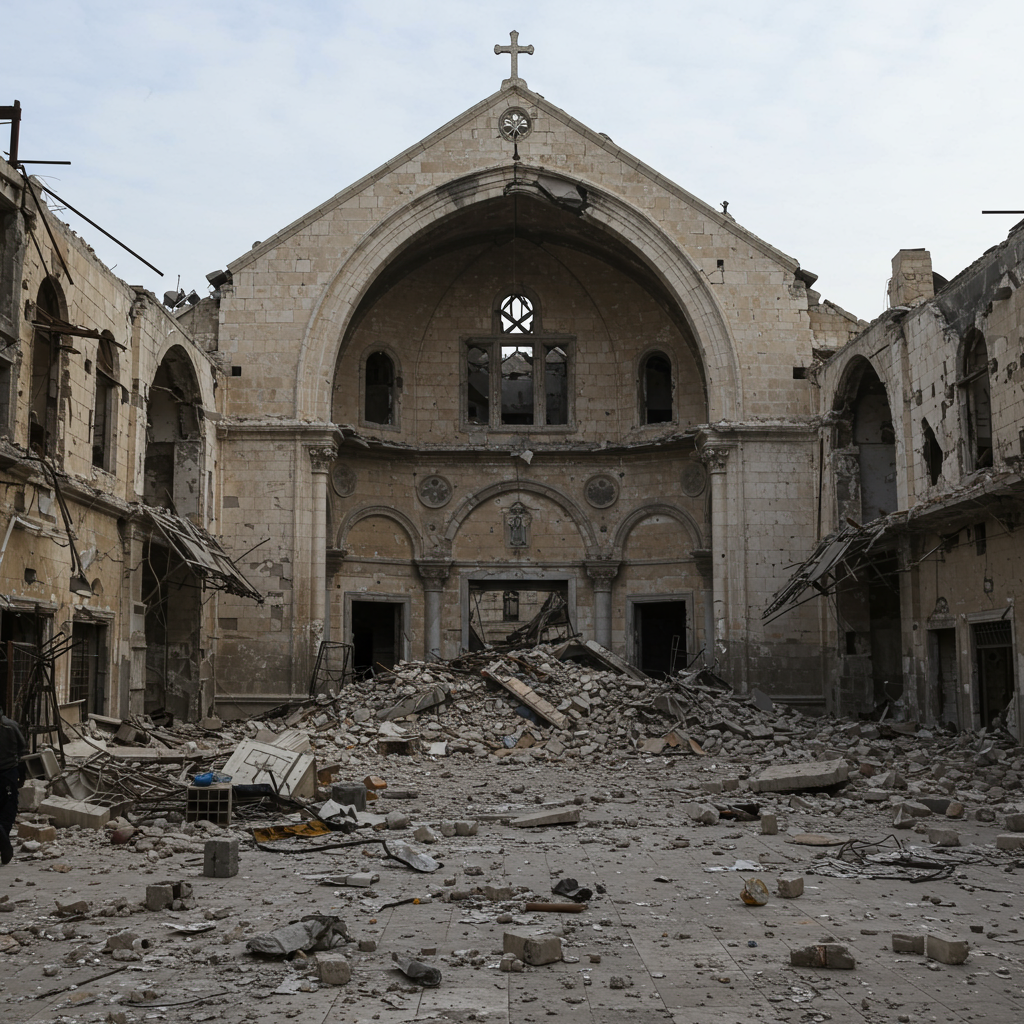A devastating wave of coordinated attacks struck Christian sites across Syria on Sunday, June 22, 2025. The deadliest incident occurred at the Mar Elias Church in Dweil’a, on the outskirts of Damascus, where a suicide bombing during mass killed at least 22 people and wounded dozens more, with casualty figures reportedly rising to 63.
Syrian authorities were quick to attribute the attacks, including the Damascus bombing, to the Islamic State (IS) group. While IS did not immediately claim responsibility for the entire series of assaults, some reports indicate they later claimed the bombing at Mar Elias Church, aligning with the Interior Ministry’s assessment that a fighter from the group carried out the attack.
Attack Details Emerge from Damascus Church
Eyewitnesses inside the Mar Elias Greek Orthodox church described a scene of terror as the assailant entered the crowded building during prayers. Accounts suggest the attacker, reportedly with his face covered, opened fire on worshippers before detonating an explosive vest near the entrance. Some witnesses, including priests present at the time when estimates of worshippers ranged from 150 to 350, also reported seeing a second gunman who fired shots but did not detonate explosives.
The combined impact of gunfire and the explosion left the church in ruins. Photos circulated by the Syria Civil Defence depicted severe devastation inside, with splintered pews, overturned furniture, and debris covered in blood.
Casualty figures were initially preliminary as rescue teams worked tirelessly to recover bodies from the scene. Multiple reports from local media and officials confirmed that children were tragically among those killed and wounded.
Coordinated Assaults Across Syria
The attack in Damascus was not an isolated event but part of a seemingly coordinated assault on Christian communities nationwide that unfolded around the same time on Sunday evening. Beyond the Mar Elias Church, the Deir Ibrahim al-Khalil Monastery, also in Damascus’s Douweila neighborhood, was targeted by a separate suicide bomber.
Further attacks were reported in other cities. In Maqsura, the Church of Our Lady was attacked with explosive devices placed at its entrance doors. Churches in the cities of Homs and Hama were also targeted by shooters. The widespread nature of the violence was underscored by reports of leaflets found at some church entrances bearing the chilling message, “Your turn is coming.”
Context: Post-Assad Syria and IS Resurgence
These coordinated attacks mark the first major assaults targeting churches in Syria in several years and are particularly significant as they occur under the leadership of the new interim government led by President Ahmed al-Sharaa. The attacks are the first of their kind since the overthrow of President Bashar al-Assad in December 2024.
The timing is critical as al-Sharaa’s government, which includes figures from the former Islamist rebel group Hayat Tahrir al-Sham (HTS), is attempting to consolidate its authority and build support among Syria’s diverse minority communities after nearly 14 years of devastating civil war. Despite the government’s public vows to protect religious and ethnic minorities and its ongoing efforts to combat IS sleeper cells, the attacks highlight the persistent security challenges and the difficulty al-Sharaa faces in asserting full control across the country.
The Islamic State appears to be attempting to exploit the security vacuum that emerged following the fall of the Assad regime to rebuild its capabilities and recruit new fighters. They may be leveraging the perceived moderation of the new government’s leadership for propaganda purposes, aiming to target disaffected Islamist fighters. Concerns about IS acquiring weapons and ammunition abandoned by fleeing forces of the former regime have also been raised.
Widespread Condemnation and Investigation
The brutal attacks drew swift and widespread condemnation from Syrian officials and the international community.
Syrian Information Minister Hamza al-Mostafa denounced the bombing in Damascus as a “cowardly terrorist attack” that went against the country’s civic values and commitment to equal citizenship, pledging state efforts to combat criminal organizations. The Syrian Interior Ministry expressed condolences and affirmed that such acts would not deter national unity. The Damascus municipality confirmed that security services have launched investigations into the incident.
Internationally, the United Nations Special Envoy for Syria, Geir O. Pedersen, strongly condemned the violence, calling it a “heinous crime.” He noted the Syrian interim authorities’ attribution of the attack to IS and called for a full investigation and action. Turkiye’s foreign ministry described the attack as “treacherous” and an attempt to disrupt efforts towards stability. France also condemned the “despicable” act, expressing solidarity with the Syrian people.
In the immediate aftermath, security forces and first responders converged on the scenes across the country. Survivors at the Mar Elias Church were observed reacting with grief and distress amidst the devastation. Investigations are ongoing as authorities work to understand the full scope and planning behind the coordinated assault.




